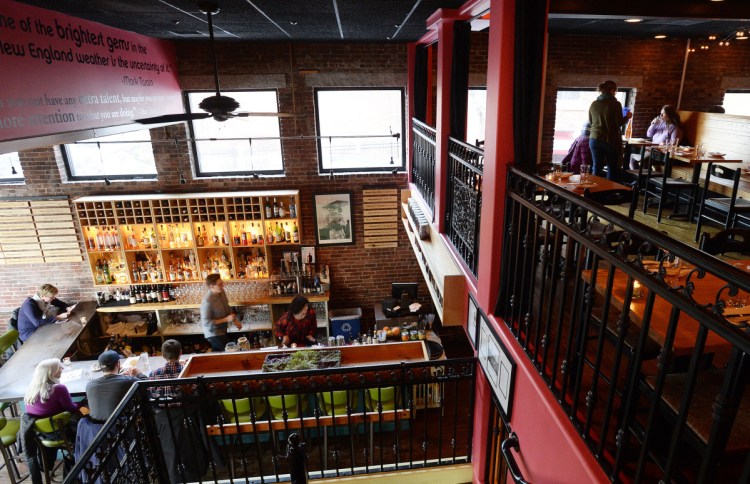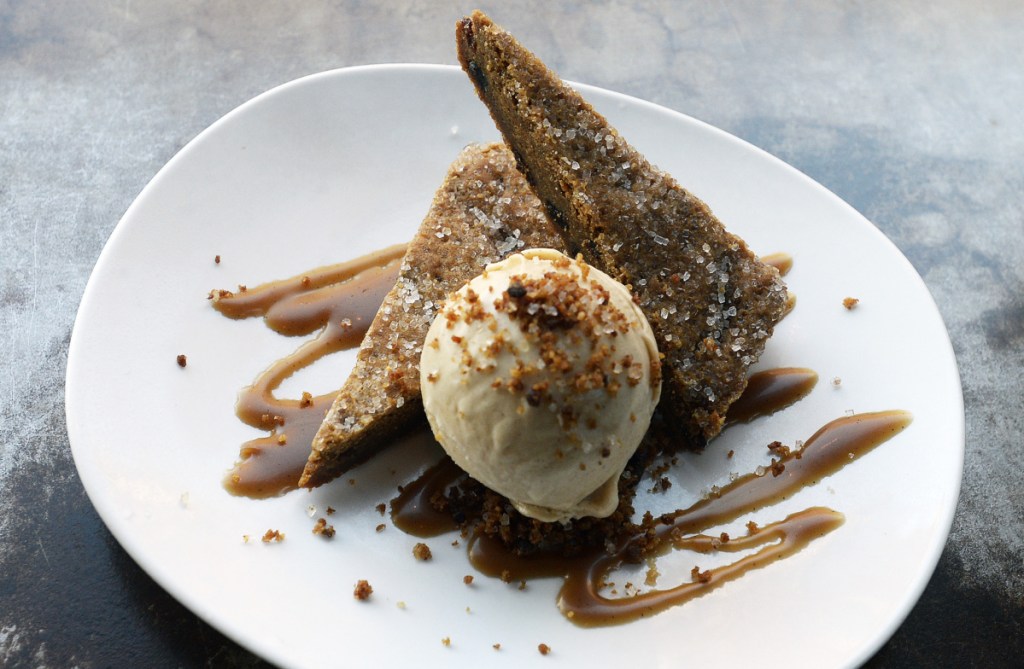The woman behind me at Moxy asked her question a few seconds after she accidentally set fire to a cloth napkin. She and her dining companion flapped the flaming rag through the air in a panic before eventually dropping it on the floor and stomping it into a smoldering mess. Everyone’s eyes were suddenly on them. Everyone’s ears, too, because we all heard her take a calming breath, then inquire with a laugh, “So, now that I’ve got your attention: How many of those dishes would you order again?”
Her friend waved a little smoke away and started tabulating plates on his fingers. I also saw diners at neighboring tables turn back to their food and boot up their own mental calculators.
When you think about it, the ratio of good-to-bad dishes is a pretty good metric of success for a restaurant that gives patrons a chance to taste many small plates over the course of a few hours, rather than just one or two larger items.
“We ate seven things,” our neighbor finally replied. “I’d probably eat four of them again.”
But knowing that chef/owner Matt Louis has been a semifinalist for the James Beard Foundation’s Best Chef: Northeast award an impressive four consecutive years running, that seemed like a low number to me – almost certainly one he would find disappointing.
Louis, who trained with Thomas Keller at Bouchon, The French Laundry and eventually at New York’s Per Se, returned to his home state of New Hampshire a little over a decade ago. After a stint at the Wentworth by the Sea hotel, he and local restaurant developer Jay McSharry opened Moxy in a quirky building in Portsmouth’s Historic District in May 2012. “I actually don’t know if there are any right angles in the entire space, but that just adds a lot of personality to it,” Louis said.
Exposed brick walls painted teal, orange and yellow add to the sense of playfulness throughout the restaurant and prime customers for an unorthodox perspective on small-plates dining. Louis calls his approach “Not Spanish. It’s modern American, with a focus on northern New England history, culture and foodstuffs,” and that’s an accurate enough description. He omits that, with close ties to local food producers, Moxy could just as easily be marketed as a farm-to-table restaurant.
But doing so might risk making the place sound too serious and strip away a little of Moxy’s carefully cultivated whimsy. You can see it in menu categories such as “one fish, two fish,” “clean plate club,” and “bigger & interactive.” It’s also there in occasionally kooky ingredient pairings that go a step too far, yielding tapas you can imagine being served in a carnival funhouse.
Take the cauliflower and carrots ($9), for example. When it arrives at the table, it looks like a straightforward, wintery roasted-vegetable dish made with local overwintered carrots, shaved Tomme cheese and boiled cider, a traditional New England reduction that makes a lively substitute for maple syrup and balsamic vinegar. But dig in, and you discover that every bite also smuggles in an unwelcome stowaway: chunks of an oat-and-pumpkin-seed crumble that tastes exactly like granola. It’s as if someone sprinkled cereal over dinner.
Bizarre contrasts also confuse the hasty pudding frites ($5), essentially fried polenta cubes topped with dueling swirls of molasses BBQ sauce and buttermilk ranch dressing – a combination straight out of someone’s pregnancy-cravings diary.
Or the still-crunchy multicolored Maine carrots ($6), drizzled with pink peppercorn vinaigrette and served in a clear glass bowl coated with an unattractive pink smear of whipped beet yogurt. The kitchen stirs shards of a buttery sunflower seed brittle into the carrots, offering extra crunch that the dish simply does not need. Worse, the brittle tips the equilibrium of the dish toward the too-sweet.
Unfortunately, an excess of sweetness diminishes several of Moxy’s dishes. In the chili pepper cornbread ($4), the restaurant’s homegrown pepper blend adds a hefty mule-kick of heat, but even that isn’t enough to counterbalance the sugar in the batter, not to mention the accompanying maple butter that tastes like cake frosting.
Perhaps the biggest misfire comes from one of the most promising dishes, the caramelized ricotta ($6). Here, Louis and his team take charred onions, top them with a quenelle of their outstanding housemade ricotta – smooth from the addition of heavy cream and a little wild from buttermilk – and serve them together with shatteringly crisp cornmeal crackers as thin as sheets of Airmail stationery. Had they left the dish there, it would have been one of the best items on the menu. Instead, they treat the ricotta like a crème brûlée, showering it with sugar that is torched into a candy shell. It’s overkill, especially with the sweet, softened onions already on the plate.
Even the restaurant’s most popular dish, short rib marmalade ($9), suffers a bit from too much sweetness introduced when the slow-braised beef is shredded and cooked down with shallots, sugar and red wine vinegar. Luckily, the elements still work together, more or less in harmony, thanks to savory components like pickled red onions and a pungent cow’s milk bleu cheese from Brookford Farm in Canterbury, New Hampshire.

Beef short rib marmalade, the restaurant’s most popular dish, features savory components like pickled red onions and a pungent cow’s milk bleu cheese.
The menu’s more savory dishes are, by and large, its most successful ones. One, the Misty Knoll Farms chicken thighs ($14), is a New England-style tribute to David Chang’s now-famous bo ssam lettuce wraps that he serves at Momofuku Ssäm Bar in New York. Whereas Chang’s wraps are Korean and sizable enough to feed three people, Louis’s are no bigger than a large appetizer and feature pan-seared chicken thighs, herbed crème fraîche, housemade hot sauce and crispy slivers of fried onion.
Another homage, Moxy’s mini red hot dogs ($11), made with local pork from Breezy Hill Farm in South Berwick, are a riff on traditional Spanish bocadillos, the small sandwiches that appear on practically every traditional tapas menu. “I figured, if we’re going to make little hot dogs for our bocadillos, and we’re a mile away from Maine, we should make them red,” Louis said. Served on miniature challah buns and dressed with local cheddar and a streak of bacon-and-Fresno-chili jam, they make perfect conceptual sense and, much more importantly, are a pleasure to eat.
Pastry chef Tyler Elliott’s chewy, molasses-flavored hermit cookie triangles ($8) also fit right in with Moxy’s efforts to anchor its dishes in New England history and tradition. Hermits used to be known for their ability to keep for weeks, or even months, but my dinner guest and I didn’t give Elliott’s a chance to showcase that particular strength. We polished ours off quickly with dripping spoonfuls of the accompanying spiced rum ice cream.
Still, when I think back to my recent meal at Moxy, one dish – probably the simplest thing I ate that night – stands out. Crispy, deep-fried Rhode Island calamari rings and tentacles dredged in buttermilk and breaded in a half-and-half mixture of corn starch and all-purpose flour ($8). “When I was doing my research for Moxy, I looked way back in time,” Louis said. “But for that dish, I had to look at modern times. It’s what (chef and New England food expert) Jasper White told me to do. Not directly, but through his cookbook.” Uncomplicated, as the best tapas usually are, and paired with a bracingly tart, chunky piccalilli, it’s a dish that I would very happily order again and again.
Andrew Ross has written about food in the United Kingdom and in New York, where he co-founded NYCnosh, a food website. He and his work have been featured on Martha Stewart Living Radio and in The New York Times. He is an internet researcher and higher education consultant. Contact him at:
andrewross.maine@gmail.com
Twitter: @AndrewRossME
Send questions/comments to the editors.




Comments are no longer available on this story